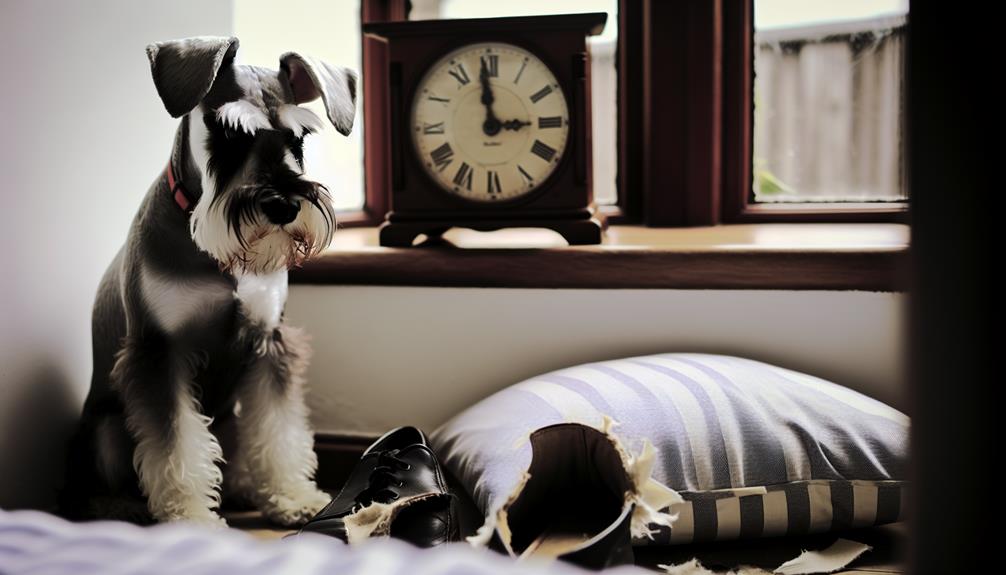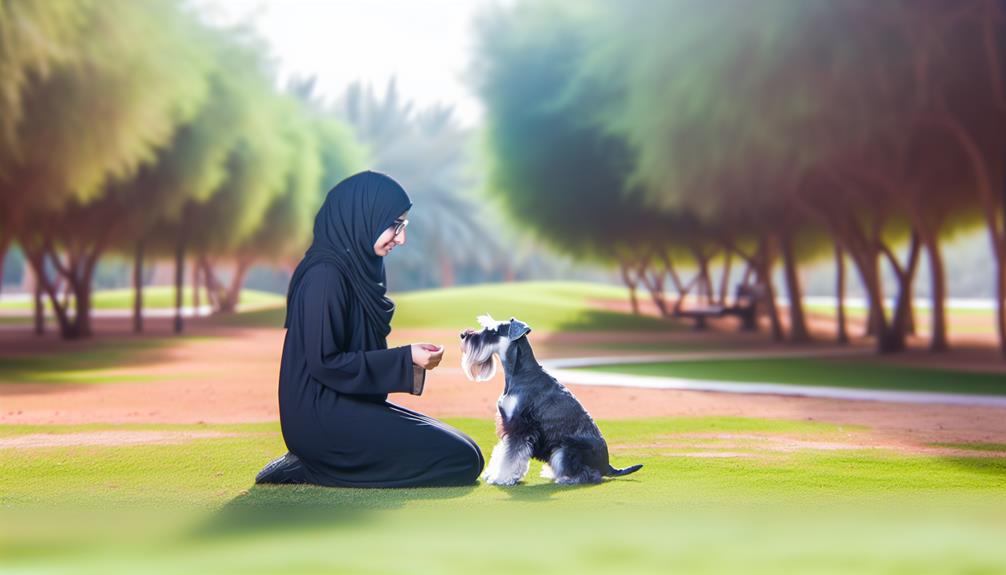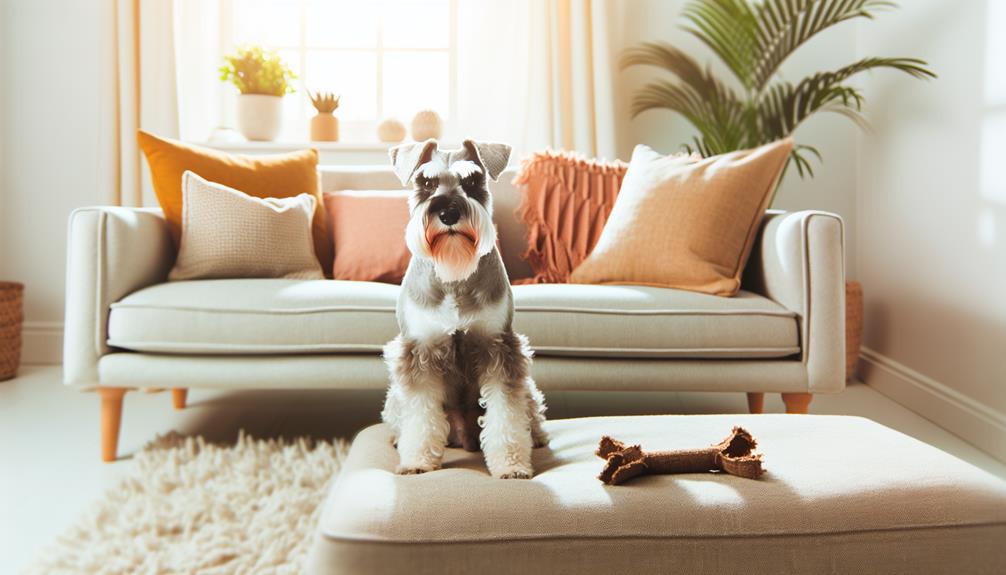Are Schnauzers Anxious?
Yes, Schnauzers, particularly Miniature Schnauzers, tend to be anxious.
They often suffer from separation anxiety, displaying behaviors like excessive barking, indoor accidents, and destructive chewing.
Common anxiety triggers include separation from owners, loud noises, and changes in routine.
Regular exercise helps reduce anxiety by releasing endorphins and preventing energy build-up.
Behavioral training, structured routines, and natural remedies like hemp oil or herbal supplements can also alleviate anxiety.
Maintaining a consistent environment is essential for their mental well-being.
For more insights on managing Schnauzer anxiety, there’s additional information available.
Jump to a Specific Section
- 1 Key Takeaways
- 2 Understanding Schnauzer Anxiety
- 3 Common Anxiety Triggers
- 4 Signs of Separation Anxiety
- 5 Impact of Exercise on Anxiety
- 6 Behavioral Training Techniques
- 7 Home Alone: Strategies
- 8 Are Schnauzers Anxious? Natural Remedies Overview
- 9 Supplements for Anxiety Relief
- 10 Anti-Anxiety Products Reviewed
- 11 Routine Establishment Benefits
- 12 Frequently Asked Questions
- 13 Are Mini Schnauzers Prone to Anxiety?
- 14 What Are Signs of Anxiety in Dogs?
- 15 What Are the Behavior Issues With Schnauzers?
- 16 Are Schnauzers Difficult Dogs?
- 17 Conclusion
Key Takeaways
- Miniature Schnauzers are prone to separation anxiety, exhibiting behaviors like excessive barking and destructive chewing.
- Loud noises, routine changes, and unfamiliar environments can trigger anxiety in Schnauzers.
- Regular exercise and structured routines are crucial in mitigating anxiety for Schnauzers.
- Behavioral training techniques and natural remedies can help alleviate Schnauzer’s anxiety.
- Creating a controlled environment, such as crating, can minimize anxiety-induced behaviors in Schnauzers.
Understanding Schnauzer Anxiety
When it comes to understanding Schnauzer anxiety, recognizing the specific behaviors and root causes is crucial for safeguarding your dog’s emotional well-being.
Miniature Schnauzers are particularly prone to separation anxiety, often displaying behaviors such as continuous barking, skin licking, and indoor accidents.
These behaviors can quickly escalate to more severe actions like destructive chewing and excessive grooming if not addressed promptly.
The causes of separation anxiety in Miniature Schnauzers can vary.
They may stem from a lack of human leadership, insufficient exercise, or feelings of loneliness.
Without the proper structure and stimulation, your dog may develop anxiety-related behaviors that negatively impact their quality of life.
Monitoring your Miniature Schnauzer’s behavior through in-home cameras can provide valuable insights into their emotional state when left alone.
These affordable devices can help you identify patterns and specific triggers, allowing you to take proactive steps to mitigate anxiety.
Addressing separation anxiety involves understanding its root causes and implementing strategies to alleviate it.
By recognizing the signs and monitoring behaviors, you can ensure your Miniature Schnauzer feels secure and content, ultimately promoting their overall well-being.
Through structured routines, adequate exercise, and mental stimulation, you’ll help your dog manage their anxiety effectively.
Common Anxiety Triggers
Recognizing common anxiety triggers in Schnauzers is essential for effectively managing their emotional well-being.
Anxious schnauzers often react to specific situations or stimuli, which can exacerbate their anxiety levels.
Understanding these common triggers can help you manage and alleviate anxiety in your pet more effectively.
| Trigger | Description | Management Strategy |
|---|---|---|
| Separation from owners | Leads to separation anxiety, causing distress when left alone | Gradual desensitization, use of calming aids |
| Loud noises | Thunderstorms, fireworks, or construction sounds | Create a safe space, use white noise |
| Changes in routine | Alterations in daily activities or schedules | Maintain a consistent routine |
| Unfamiliar environments | New places or moving to a new home | Gradual exposure, familiar items |
| Meeting new people/animals | Interaction with strangers or other pets | Controlled introductions, positive reinforcement |
Separation anxiety is a prominent issue for Schnauzers, as they form strong bonds with their owners.
Additionally, loud noises like thunderstorms or fireworks can be distressing.
Changes in routine, unfamiliar environments and encounters with new people or animals are also common triggers.
By recognizing these triggers, you can implement strategies like maintaining a consistent routine, creating safe spaces, and using gradual desensitization techniques to help manage and alleviate anxiety in your Schnauzer.
Signs of Separation Anxiety

Identifying signs of separation anxiety in Schnauzers is essential for ensuring their emotional well-being and preventing behavioral issues.
One of the primary signs of separation anxiety in Schnauzers is excessive barking when left alone.
This vocalization often indicates distress and a need for companionship.
Another common sign is destructive behavior, such as chewing furniture or scratching doors.
These actions can be a Schnauzer’s way of coping with stress or boredom.
Skin licking or self-grooming excessively is another indicator.
This repetitive behavior may be a self-soothing mechanism in response to anxiety.
Indoor accidents, particularly in a house-trained Schnauzer, can also be a red flag for separation anxiety.
Monitoring your Schnauzer’s behavior while you’re away is vital for identifying these signs.
Affordable in-home cameras, available for as low as $40, can provide valuable insights into your pet’s activities and emotional state.
Impact of Exercise on Anxiety
Regular exercise plays an important role in reducing anxiety in Schnauzers by releasing endorphins and promoting relaxation.
When you engage your dog in daily walks or playtime, it helps prevent the build-up of excess energy that often manifests as anxious behaviors.
Physical activity is essential for maintaining your Schnauzer’s mental and emotional well-being, which in turn fosters a calmer demeanor.
Lack of exercise can contribute to anxiety in Schnauzers, making it vital to provide sufficient physical activity.
Regular exercise not only tires them out physically but also mentally stimulates them, reducing the likelihood of anxiety.
Activities like fetch, agility training, or even simple games can have a significant impact on your Schnauzer’s anxiety levels.
Interactive play and structured exercise routines can create a balanced environment for your dog, promoting a sense of security and calm.
By incorporating consistent physical activity into your Schnauzer’s daily routine, you’re addressing one of the root causes of canine anxiety.
This approach is particularly beneficial for Schnauzers, who thrive on routine and physical engagement to stay calm and relaxed.
Ensuring your dog gets adequate exercise is a proactive step in managing their anxiety effectively.
Behavioral Training Techniques

Behavioral training techniques effectively reduce anxiety in Schnauzers by addressing the root causes of their anxious behaviors.
For miniature schnauzers, important reinforcement is essential.
Rewarding calm behavior with treats or praise can help your dog associate relaxation with positive outcomes.
Desensitization and counter-conditioning are also necessary.
Gradually exposing your Schnauzer to anxiety-inducing situations while maintaining a calm environment can help them develop resilience.
As a pack leader, your calm and assertive demeanor will reassure your Schnauzer.
Establishing a structured daily routine can provide predictability, reducing anxiety.
Consistency in commands and responses reinforces desired behaviors, making your dog feel more secure.
Mental stimulation and physical exercise are crucial.
Puzzle toys, training sessions, and regular walks can keep your Schnauzer’s mind and body active, reducing anxious energy.
In some cases, anti-anxiety supplements may be beneficial.
Consult your vet to make sure these supplements are appropriate and safe for your pet.
If you find it challenging to help your dog, consider working with a professional trainer or behaviorist.
Their expertise can provide tailored strategies to address your Schnauzer’s specific needs.
With patience and the right techniques, you can effectively calm your dog’s anxiety.
Home Alone: Strategies
When leaving your Schnauzer home alone, implementing specific strategies can greatly reduce their separation anxiety.
Miniature Schnauzers are particularly prone to this condition, often displaying behaviors like excessive barking and destructive tendencies.
To mitigate these symptoms, start by establishing regular exercise routines.
Adequate physical activity not only tires out your dog but also reduces stress levels, making them less anxious when you’re away.
Monitoring your Schnauzer’s behavior through affordable in-home cameras can provide insights into their anxiety triggers.
This allows you to address specific issues more effectively. In addition to physical exercise, mental stimulation is vital.
Interactive toys and puzzle feeders can keep your Schnauzer occupied and mentally engaged, reducing the likelihood of anxiety-driven behaviors.
Crating or confining your Schnauzer to a safe area can offer a sense of security.
This controlled environment minimizes the risk of destructive behavior and accidents.
Utilizing conditioning techniques, such as gradually increasing the duration of alone time, can also help your Schnauzer become more comfortable when alone.
Start by leaving them alone for short periods and gradually extend the time to build their tolerance.
By employing these strategies, you can significantly ease your Miniature Schnauzer’s separation anxiety.
Are Schnauzers Anxious? Natural Remedies Overview

Frequently, natural remedies like hemp oil and herbal supplements offer effective ways to calm anxious Schnauzers without the need for prescription medications.
These remedies are particularly beneficial for mini schnauzers experiencing separation anxiety, providing a notably gentler alternative that promotes overall well-being.
Hemp oil is rich in cannabinoids, which can help reduce anxiety by interacting with your schnauzer’s endocannabinoid system.
This promotes a calming effect and can reduce behaviors like excessive barking or destructive tendencies.
Herbal supplements, such as those containing chamomile or valerian root, also provide calming signals to the nervous system, aiding in relaxation.
In addition to these, compression wraps like the Thundershirt apply gentle pressure, mimicking the sensation of being held.
This can notably reduce anxiety levels in your mini schnauzer, particularly during stressful situations like thunderstorms or when left alone.
Similarly, pheromone diffusers emit calming signals that replicate those produced by a mother dog, offering a sense of security and comfort.
Anti-anxiety supplements that include ingredients like L-tryptophan, L-Theanine, and melatonin further support anxiety management.
These natural remedies, when combined appropriately, can effectively mitigate separation anxiety and improve your schnauzer’s quality of life.
Supplements for Anxiety Relief
In addition to natural remedies, supplements specifically designed for anxiety relief can greatly benefit Miniature Schnauzers experiencing stress and anxiety.
Herbal supplements containing calming ingredients like chamomile and ginger root have been shown to alleviate anxiety symptoms.
These natural ingredients can help soothe your Schnauzer, making them feel more at ease.
Anti-anxiety supplements often include compounds like L-tryptophan, L-Theanine, and Melatonin.
L-tryptophan and L-theanine are amino acids that promote relaxation without sedation, while Melatonin helps regulate sleep patterns and reduce anxiety.
These ingredients work in concert to provide effective anxiety relief for your dog.
Pheromone diffusers are another option for creating a calming environment.
These devices release synthetic pheromones that mimic those produced by a mother dog, providing a sense of security and comfort.
When used in combination with calming supplements, pheromone diffusers can notably reduce anxiety levels in Schnauzers.
Additionally, full-spectrum hemp treats and oils have become popular for their calming effects.
These products can help your Schnauzer respond positively to training and manage anxiety.
By incorporating these supplements and calming ingredients into your dog’s routine, you can effectively reduce their stress and enhance their overall well-being.
Anti-Anxiety Products Reviewed

Evaluating anti-anxiety products for Miniature Schnauzers can help you identify the most effective solutions to alleviate your dog’s stress and promote their well-being.
There are several anti-anxiety products available that can aid in managing your mini schnauzer’s anxiety effectively.
Calming supplements, such as those containing chamomile, passion flower, and ginger root, can quickly relieve stress.
These supplements are designed to provide a natural calming effect.
Canine pheromone diffusers mimic the calming pheromones of a mother dog, creating a relaxing environment for anxious Schnauzers.
Compression wraps, like the Thundershirt, apply gentle pressure to your dog’s body, which can reduce anxiety in about 80% of dogs.
Here’s a comparison of some common anti-anxiety products:
| Product | Key Ingredients/Features |
|---|---|
| Calming Supplements | Chamomile, Passion Flower, Ginger Root |
| Canine Pheromone Diffusers | Mimic calming pheromones from a mother dog |
| Compression Wraps | Gentle pressure, such as Thundershirt |
| Anti-Anxiety Supplements | L-Tryptophan, L-Theanine, Melatonin |
These products have varying effectiveness based on your mini schnauzer’s specific needs.
For instance, about 67% of dog owners found hemp oil effective for anxiety in Mini Schnauzers.
By evaluating these options, you can find the best anti-anxiety products to help your furry friend live a calmer, happier life.
Routine Establishment Benefits
Establishing a consistent routine for Miniature Schnauzers greatly reduces anxiety by providing structure and predictability in their daily lives.
When you maintain regular feeding, exercise, and playtime schedules, your Schnauzer feels more secure and less anxious.
This predictability can make a big difference, especially when you leave the house.
The dog sees the routine as a sign that you’ll be back in the house and isn’t afraid that something unexpected will happen during your absence.
Routine walks and mental stimulation activities are essential.
They prevent boredom, which can otherwise lead to anxiety.
Incorporating regular training sessions and positive reinforcement techniques into your daily routine can also boost your Schnauzer’s confidence, further reducing anxiety levels.
This structured environment makes a substantial impact on their overall mental well-being.
Creating a calm and predictable environment through a structured routine can significantly benefit Miniature Schnauzers prone to anxiety.
Consistent daily activities, from feeding times to exercise, help establish a sense of normalcy.
By adhering to a routine, you help your Schnauzer cope better with the stresses of daily life, ensuring they remain content and well-adjusted.
Frequently Asked Questions
Are Mini Schnauzers Prone to Anxiety?
Imagine your Mini Schnauzer, Max, chewing furniture when alone. Mini Schnauzers are prone to anxiety, often exhibiting excessive barking, destructive behavior, or accidents. Monitoring and providing exercise, mental stimulation, and routines can help reduce anxiety.
What Are Signs of Anxiety in Dogs?
You can identify signs of anxiety in dogs by observing behaviors like excessive barking, pacing, shaking, or hiding. Changes in appetite, sleep patterns, and grooming habits also indicate stress. Monitor your dog’s behavior closely for these symptoms.
What Are the Behavior Issues With Schnauzers?
Schnauzers can exhibit behavioral issues like excessive barking, destructive tendencies, indoor elimination, and mood swings. Addressing these through proper exercise, mental stimulation, and consistent routines helps mitigate issues, ensuring a balanced and well-behaved Schnauzer.
Are Schnauzers Difficult Dogs?
Schnauzers aren’t necessarily difficult dogs, but they require consistent training, exercise, and mental stimulation. Without these, they might develop behavioral issues. Understanding their needs and providing proper care guarantees they thrive and remain well-behaved.
Conclusion
It’s no coincidence that addressing your Schnauzer’s anxiety can lead to a healthier, happier pet.
By understanding anxiety triggers, incorporating regular exercise, and employing behavioral training, you can greatly reduce their stress.
Natural remedies and supplements offer additional support, while anti-anxiety products and consistent routines provide stability.
With these strategies, you’ll create a secure environment that makes time apart less stressful for both you and your Schnauzer, fostering a stronger bond and overall well-being.
